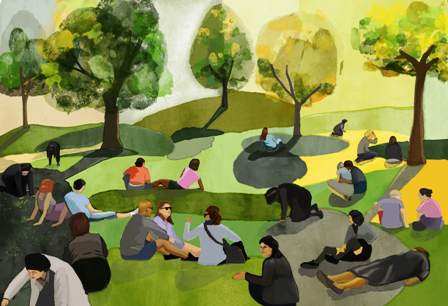


WHEN TREES BLOOM AT HOME AGAIN

Filma Film Fest Ukraine:
WHEN TREES BLOOM AT HOME AGAIN
migration as a result of military conflict
After February 24 we all began to live in a new reality shaped by the full-scale war waged by Russia against Ukraine. The passage of time is now marked by shelling, air-raid alerts, curfews, and most recently, by blackouts. The lives of people and all other creatures have become ultimately precarious. Cities and villages are smashed into ruins, and whole ecosystems are perishing. Thousands of Ukrainians (often with animals and plants) have to flee the war to other cities, regions, and countries. To express solidarity with every human, every living being who has lost or had to flee their home, we decided to make migration in armed conflict the topic of this year’s only “Filma” program.
As a feminist collective, we encourage you to show solidarity with groups who experience discrimination. That’s why it’s important for us to screen these films,where directors tell the stories of their own migration experiences, or keep their creative concepts as non-stigmatizing, non-exoticizing as possible. We believe that this solidarity is impossible without comprehensive critical re-evaluation of the systems of oppression (such as colonialism, patriarchy, capitalism, etc.) and power structures. That’s why every film on the program marks our attempts to discuss complicated, often silenced topics, including the bio- and necropolitics of EU/West imposed on migrants during waves of migration in the second half of the 2010s and at the beginning of the 2020s; apartheid against Palestinians and the settler colonialism of the State of Israel; the telling inaction of the international community in regards to wars of aggression waged by Russia in the 1990s–2020s; the impact of the legacy of colonialism on the armed conflicts and ethnic cleansing in South Asia, Southeast Asia, and in the Near East.
Our program consists of eight films arranged to make up a single meta-story about the loss of home and the long way back to the homeland. We would like you to start with “Remember the smell of Mariupol” by Zoya Laktionova, and then move on to “My Favorite Job, 2022” by Sashko Protyah. In Zoya’s film, the author travels through the memories of her hometown that become entangled with horrendous images of war.
The story of volunteers filmed by Sashko Protyah demonstrates how courage and grassroots self-organization saves lives even when it is deemed impossible. In both works, the authors reflect upon the loss of their hometown Mariupol which was occupied and virtually destroyed by Russia in the spring of 2022.
We recommend you next watch “Newsreel 63 – The Train of Shadows” produced by the Slovenian collective Newsreel Front, “Purple Sea” by Amel Alzakout and Khaled Abdulwahed, and “Landscape of Terror” by Kasia Hertz. The authors of the video essay “The Train of Shadows” reflect upon the ethics of cinema by telling the intermingled story of railways, migration, and cinema. In this work, Amel Alzakout combines her chronicle of migration through the Mediterranean sea with reflections on the fragility of life, her relationship with her husband, and the dehumanizing nature of the contemporary media. Kasia Hertz filmed the stories of refugees who survived the inhuman conditions and violence at the border between Belarus and Poland at the end of 2021. Each film shows how perilous, if not deadly, the road of those seeking asylum may be.
Then check out the films ”I Swam Enguri” by Anuna Bukia and “The Turtle’s Rage” by Pary El-Qalqili. Along with the characters of her film, Anuna crosses the border from occupied Abkhazia to Russia and witnesses the aftermath of the war in her home city of Sukhumi. Pary El-Qalqili tells the story of her Palestinian family to show how devastating the trauma of forced displacement can be.
We conclude this cinematic journey with the film “5 Exchange Lane” by Anirban Dutta. “The Turtle’s Rage” and “I Swam Enguri” both depict a journey to an occupied home which is filled with disappointment and sorrow. However, the story of the Cole family taking their journey accompanied by the film director is filled with the fragile hope of regaining memories of home, of reconciling with the pain of its loss.
We named the program “When Trees Bloom at Home Again”, because we believe that every place has the power to restore itself. And that like trees, the feeling of home will sprout and blossom, despite all attempts to destroy it. We dream that all those who want to return will see that bloom again.